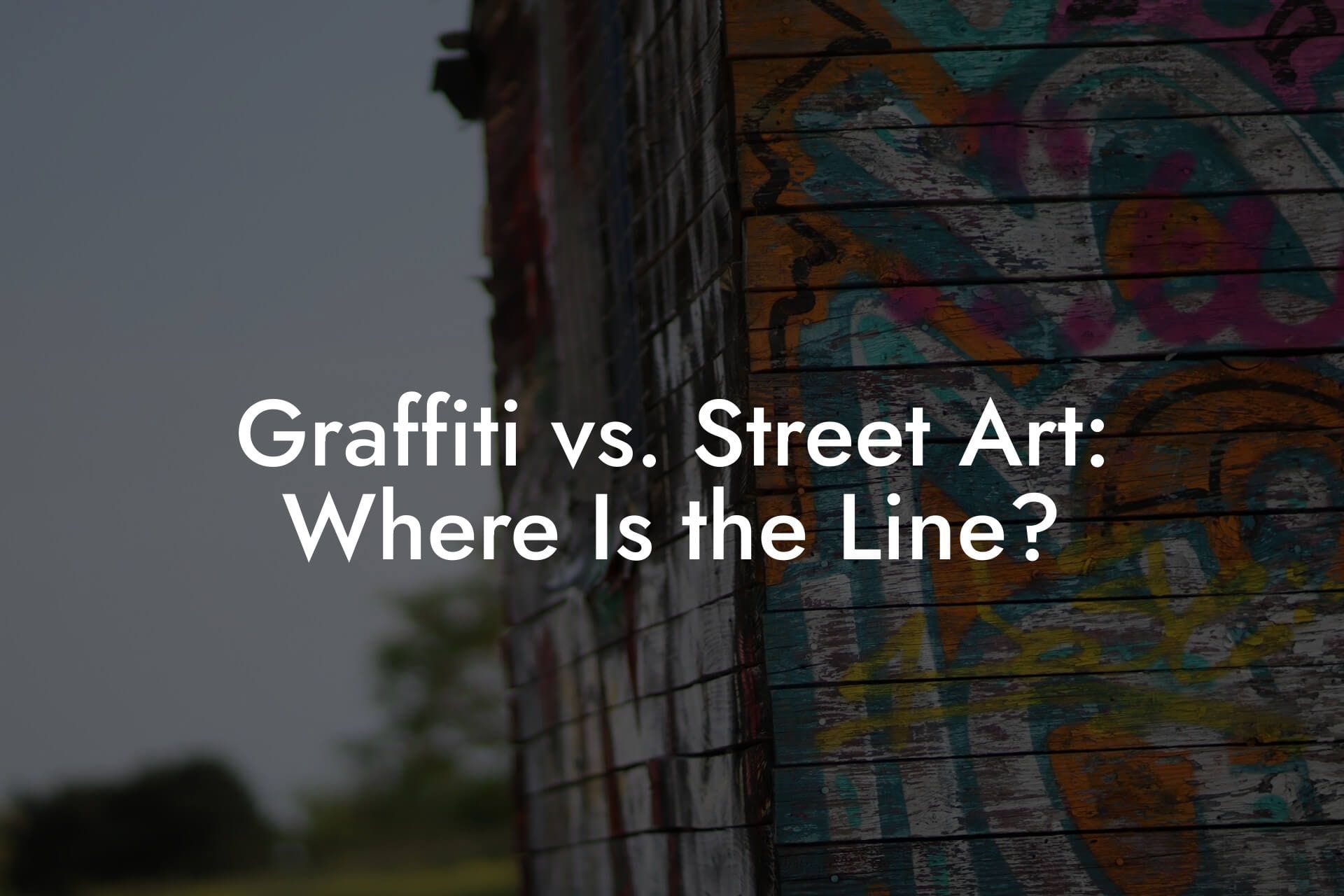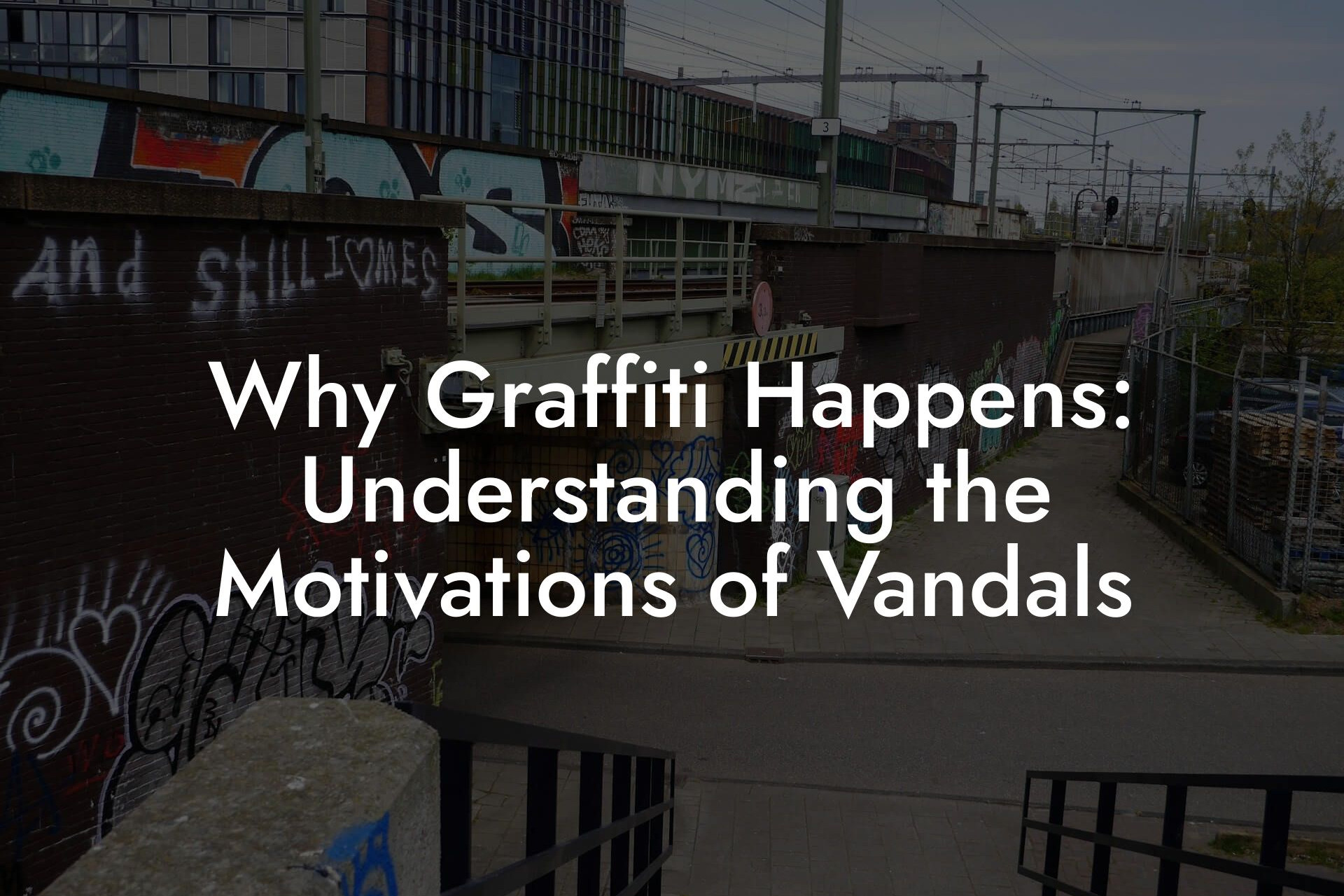Graffiti has been a part of London's urban landscape for decades, with the city's streets serving as a canvas for artists, vandals, and activists alike. From the early days of punk rock to the modern-day street art scene, graffiti has evolved into a complex and multifaceted phenomenon. As a business specializing in graffiti removal and vandalism cleanup, we at Graffiti Removal London have seen firsthand the impact that graffiti can have on commercial properties and communities.
Table of Contents
The Rise of Graffiti in London's Streets
In the 1970s and 1980s, graffiti began to emerge as a form of self-expression and rebellion in London's streets. Inspired by the punk rock movement and the work of American graffiti artists, London's young people began to experiment with spray paint and stencils. The city's streets became a battleground for rival crews and gangs, with each group vying for dominance and recognition.
Famous Graffiti Artists in London
London has been home to some of the world's most renowned graffiti artists, including:
- Banksy: The elusive and enigmatic Banksy is perhaps the most famous graffiti artist to emerge from London. Known for his witty, subversive, and often provocative works, Banksy has become a global phenomenon.
- Robbo: A pioneer of London's graffiti scene, Robbo was a key figure in the development of the city's street art culture. His work continues to inspire and influence new generations of artists.
- Blek le Rat: A French artist who has worked extensively in London, Blek le Rat is known for his stencils and murals, which often feature rats and other urban wildlife.
Popular Graffiti Tags in London
Graffiti tags are a staple of urban landscapes around the world, and London is no exception. Some of the most popular graffiti tags in London include:
- The "London Handstyle": A distinctive, cursive script that has become synonymous with London's graffiti scene.
- The "UK Tag": A bold, block-letter tag that is often used by UK-based graffiti artists.
- The "Stencil Tag": A tag that incorporates stencils and other graphic elements, often used by artists to add an extra layer of complexity to their work.
The Impact of Graffiti on Commercial Properties
Graffiti can have a significant impact on commercial properties, from damaging buildings and equipment to deterring customers and reducing property values. As a business, it's essential to take a proactive approach to graffiti removal and prevention, rather than waiting for the problem to escalate.
Graffiti Removal Methods
At Graffiti Removal London, we use a range of methods to remove graffiti from commercial properties, including:
- Chemical removal: Using specialized chemicals to break down and remove graffiti.
- Pressure washing: Using high-pressure water jets to blast away graffiti.
- Sanding and scraping: Using abrasive materials to remove graffiti from rough surfaces.
Preventing Graffiti on Commercial Properties
While removal is an essential part of graffiti management, prevention is also key. Some effective ways to prevent graffiti on commercial properties include:
- Installing CCTV cameras and security lighting to deter vandals.
- Applying anti-graffiti coatings to surfaces.
- Implementing rapid removal policies to prevent graffiti from becoming a persistent problem.
The Future of Graffiti in London
As London continues to evolve and grow, it's likely that graffiti will remain a part of the city's cultural landscape. While graffiti can be a problem for commercial properties, it's also a vibrant and dynamic art form that deserves to be recognized and celebrated. By working together to find solutions to graffiti, we can create a more vibrant, inclusive, and beautiful city for all.
Frequently Asked Questions
What is graffiti and why is it a problem?
Graffiti is a form of vandalism that involves writing or drawing on surfaces without permission. It can be a problem for property owners and businesses because it can damage property, decrease property value, and create an eyesore. Additionally, graffiti can also be a sign of underlying social issues, such as lack of opportunities for young people or feelings of disengagement from the community.
What is the difference between graffiti and street art?
While both graffiti and street art involve creating artwork in public spaces, the main difference is that street art is typically done with permission from the property owner, whereas graffiti is done without permission. Street art can also be a positive addition to a community, adding character and beauty to an area.
Who are some famous graffiti artists in London?
London is home to a thriving graffiti scene, and some famous graffiti artists include Banksy, Shepard Fairey, and Blek le Rat. These artists have gained international recognition for their work, which often combines graffiti with other forms of street art.
What are some popular graffiti tags in London?
Graffiti tags are a way for artists to sign their work, and some popular tags in London include "Tox", "Fuel", and "Voodoo". These tags can be seen in various locations around the city, from buildings to bridges.
Why do people create graffiti?
People create graffiti for a variety of reasons, including to express themselves, to make a political statement, or to simply add some beauty to an area. For some, graffiti is a way to rebel against authority or to challenge social norms.
Is graffiti illegal in London?
Yes, graffiti is illegal in London, and those caught creating it can face fines or even criminal charges. The British Transport Police and the Metropolitan Police Service take graffiti seriously and work to prevent it and prosecute those responsible.
How can I remove graffiti from my property?
Removing graffiti can be a challenge, but it's important to act quickly to prevent it from becoming a permanent fixture. At Graffiti Removal London, we offer a range of services to help you remove graffiti from your property, from chemical removal to pressure washing.
What are the best methods for removing graffiti?
The best method for removing graffiti depends on the type of surface and the type of graffiti. Chemical removal is often effective for removing graffiti from metal and concrete surfaces, while pressure washing can be used for removing graffiti from brick and stone surfaces. It's also important to use the right cleaning products to avoid damaging the surface.
Can I remove graffiti myself?
While it's possible to remove graffiti yourself, it's not always recommended. Graffiti removal requires specialized equipment and techniques, and attempting to remove it yourself can damage the surface or spread the graffiti further. It's often best to hire a professional graffiti removal service like Graffiti Removal London.
How can I prevent graffiti on my property?
Preventing graffiti on your property requires a combination of deterrence and design. Installing security cameras, improving lighting, and using anti-graffiti coatings can all help to deter graffiti artists. Additionally, designing buildings and public spaces with graffiti prevention in mind can also help to reduce the incidence of graffiti.
What are anti-graffiti coatings?
Anti-graffiti coatings are specialized coatings that can be applied to surfaces to make it easier to remove graffiti. These coatings work by creating a barrier between the surface and the graffiti, allowing for easy removal without damaging the surface.
How can I report graffiti in London?
If you see graffiti in London, you can report it to the local authorities or to the police. You can also report graffiti to Transport for London if it's on public transportation or in a transportation hub.
What is the cost of graffiti removal in London?
The cost of graffiti removal in London varies depending on the size and location of the graffiti, as well as the type of surface it's on. At Graffiti Removal London, we offer competitive pricing for our services, and we can provide a quote based on your specific needs.
How long does graffiti removal take?
The time it takes to remove graffiti depends on the size and complexity of the job. At Graffiti Removal London, we work efficiently to remove graffiti as quickly as possible, often completing jobs in a matter of hours or days.
Can I claim compensation for graffiti damage?
If you're a property owner or business affected by graffiti, you may be able to claim compensation for the damage. The amount of compensation you can claim will depend on the extent of the damage and the cost of removal.
How can I protect my business from graffiti?
Protecting your business from graffiti requires a combination of prevention and response. Installing security cameras, improving lighting, and using anti-graffiti coatings can all help to deter graffiti artists. Additionally, having a plan in place for responding to graffiti, such as contacting a graffiti removal service like Graffiti Removal London, can help to minimize the impact of graffiti on your business.
What are the consequences of not removing graffiti?
Failing to remove graffiti can have serious consequences, including decreased property value, increased risk of further vandalism, and a negative impact on the community. Additionally, leaving graffiti in place can also create an eyesore and detract from the appearance of an area.
How can I get involved in graffiti removal efforts in London?
There are several ways to get involved in graffiti removal efforts in London, including volunteering with local community groups or partnering with businesses like Graffiti Removal London. You can also report graffiti to the authorities and support initiatives that promote street art and community engagement.
What is the impact of graffiti on the community?
Graffiti can have a significant impact on the community, including decreasing property value, creating an eyesore, and promoting a sense of disorder. However, graffiti can also be a positive force, promoting creativity and self-expression.
Can graffiti be a form of free speech?
Graffiti can be a form of free speech, as it allows individuals to express themselves and share their views with the public. However, it's important to balance this right with the rights of property owners and the need to maintain public order.
How can I learn more about graffiti and graffiti removal?
There are several resources available for learning more about graffiti and graffiti removal, including online articles, books, and workshops. At Graffiti Removal London, we're happy to provide information and advice on graffiti removal and prevention.
What is the future of graffiti in London?
The future of graffiti in London is uncertain, but it's likely that graffiti will continue to be a part of the city's cultural landscape. As the city continues to evolve and grow, it's possible that graffiti will become more accepted and integrated into the urban environment.
Toby Doherty
Toby Doherty is a seasoned graffiti removal expert with over 20 years of experience in the industry. Throughout his career, Toby has helped countless businesses and property owners in London maintain clean, graffiti-free spaces. His extensive knowledge of graffiti removal techniques, from eco-friendly solutions to advanced technologies like laser cleaning, makes him a trusted authority in the field. Passionate about restoring urban environments, Toby combines his hands-on expertise with a commitment to staying up-to-date on the latest industry trends and innovations. When he’s not out in the field, Toby shares his insights through detailed articles, offering practical advice on everything from graffiti prevention to legal considerations.




